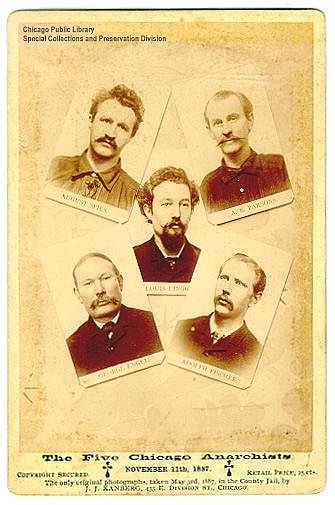Are you annoyed by this page's color scheme, or do you want to print this page? Check out the printer-friendly version!

If you're anything like me (middle class and American is close enough), you probably were told little or nothing in school about this holiday that is celebrated by workers throughout the world, and what you were told was probably false. Mostly this has to do with America's fear and loathing of any economic and political system other than capitalism, and of Russia and communism in particular. (Yes, I grew up during the Cold War.) I remember being told about how May Day was celebrated in Russia with tons of military pomp and circumstance--flag-bedecked tanks rolling through Red Square while the masses (no doubt forced to attend the celebration) stood in mute admiration of the illusory might of their nation. The implication was that May Day was purely a communist holiday, and it was made to seem rather silly and ostentatious to peaceful, law-abiding, non-militaristic Americans like us (read in lots of sarcasm here). Needless to say, I was astonished and appalled to discover what May Day/Labor Day was really about, and to realize that the holiday is officially celebrated practically everywhere but in the country where the events commemorated on May 1st took place.
So, kids, here's the story you didn't get in your high school history textbooks...
In the 1880s in the good ol' US of A, working conditions for the average person weren't the same as they are now. Many things that we now take for granted in our working lives were not available to workers then. One of these things is the 8-hour work day. In 1884, the Federation of Organised Trades and Labor Unions of the United States and Canada made the 8-hour work day one of their major causes. Among the things they did was pass a resolution stating that "eight hours shall constitute a legal day's work from and after May 1, 1886, and that we recommend to labour organisations throughout this district that they so direct their laws as to conform to this resolution." They also called on their members and members of other unions to strike on May 1, 1886 in support of this resolution.
The strike for an 8-hour work day happened as planned, with heavy participation throughout the country, and especially in Chicago, IL. On May 3, 1886, police fired into a crowd of striking workers at the McCormick Harvester Machine Company in Chicago. Many striking workers were injured, and one was killed. In response, Chicago anarchists who were active in the labor movement called for a workers' meeting the next day in Haymarket Square to protest the police's actions. The meeting was peaceful until the end, when Chicago police showed up and ordered the people to disperse. At this point, someone threw a bomb at the police, who started shooting into the crowd. Chaos ensued, and many people were killed and injured in the fray.
After the incident in Haymarket Square, meeting halls, trade organizations, and private homes in Chicago were raided in an attempt to round up all known anarchists and socialists. This was done in order to quell further union and anarchist protests and to find someone to blame for the bombing. Anarchists in particular were very active in the labor movement in Chicago at the time, and so they became the State's leading suspects in the case. In the end, eight anarchists were arrested and accused of being accessories to murder in the Haymarket bombing. The trial was clearly stacked against the accused. Despite the fact that there was never any evidence presented that they had anything to do with the bombing, the eight men were convicted. Seven were sentenced to death and one to 15 years in prison.
Once the news of the convictions and the mens' sentences made it into the press, a huge international outcry of protest was heard in support of the anarchists. This campaign in support of the convicted men resulted in two of the men's death sentences being commuted to life in prison. However, the other five men remained on Death Row. One of them, Louis Lingg, committed suicide on the night of his execution, and the remaining four (August Spies, George Engel, Albert Parsons, and Adolph Fischer) were hanged on November 11, 1887. These five men are known in labor history as "The Haymarket Martyrs".
In 1889, Americans who attended the International Socialist Congress proposed that May 1st be adopted as a worker's holiday in honor of the "Chicago Eight". Since then, May Day has been celebrated around the world as a day of international workers' solidarity. Finally, in 1893, the new Governor of Illinois pardoned the Chicago Eight because their trial was so obviously unfair.
It's really strange to think that people were imprisoned and executed over something that seems as trivial to us as the 8-hour work day. But it's true. So, kids, if you're happy to get out of work at 5 or 6 p.m., remember the Haymarket Martyrs and thank the labor movement! And consider joining in the May Day festivities in your town next time.